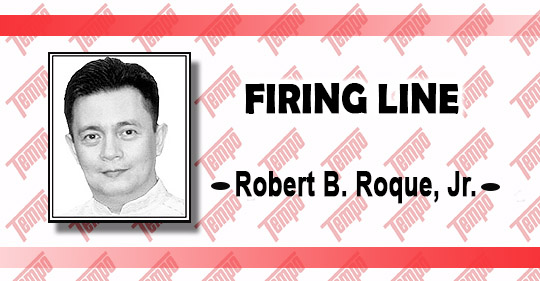BY ROBERT B. ROQUE, JR.
Rocked by a P15-billion (probably more) anomaly, the Philippine Health Insurance Corp. is in a rut. Imagine the great Westerns showing the cowboy buried with only his head sticking out of the ground? That’s pretty much the type of hole corrupt officials dug up for the PhilHealth.
It was gut-wrenching to watch, but the Senate and the government’s task force have unraveled how PhilHealth officials systematically skinned the state insurance firm and bled it of our money.
For the depth of his threshold for brutality, even President Duterte declared he could not take the rabid corruption at PhilHealth and is, thus, considering its privatization.
Hold your horses, Mr. President, but this corner appeals to your better judgment to use the more than one-and-a-half years left in your term to turn this around. And privatization, in my humble opinion, is not the miracle pill for this situation.
First, the Universal Health Care Law (UHC), enacted in February 2019, assures every citizen access to a comprehensive set of health services. It is only made possible through a unified government program to address the population’s health, which includes a mechanism of control over PhilHealth, especially for benefits of non-contributors relying entirely on tax money.
In developed countries, privatization might work so as to tap bigger capital investments and avoid straining government coffers. But even in these cases, a state industry is passed on in good stead.
In the Philippine setting, government-owned or controlled corporations (GOCCs) are privatized because they’re in the red. The problem is – and we’ve seen this before – a private take-over comes with sweet deals from government such as tax exemptions and even guaranteed loans from global financing institutions. Is the government really being rescued or pushed further down in debt?
Senator Bong Go, who we know has the President’s ear, harped on the UHClaw’s very essence as an obligation of government. He warned that privatizing PhilHealth would only make the state insurer profit-oriented. “Profit isn’t the business of government,” he said. “It is service.”
In fact, shouldn’t we be moving towards nationalist industrialization? I know it’s a long shot. It took the United States a hundred-years-and-one to achieve that, but privatizing the state insurer is clearly a step backward. Our government should take responsibility for our nation’s basic needs – now, more than ever, the pandemic makes the issue of health first-grade basic. It should not put public interest, especially the interest of those who can hardly afford a meal, in the hands of capitalists.
The problem of PhilHealth is mismanagement due to corruption. In a previous column, I have kept my hopes up with the President’s choice of Atty. Dante Gierran as PhilHealth’s new president. He’s a man of integrity and capability, and he has offered to rid the firm of anomalies in two years.
Even a suggestion to privatize PhilHealth at this point paints the complexion of incompetence and irresponsibility on government as an institution. It’s what communists feed on to raise an army of insurgents. Why not give PhilHealth another chance?
*
SHORT BURSTS. For comments or reactions, email firingline@ymail.com or tweet @Side_View. Read current and past issues of this column at Tempo – The Nation’s Fastest Growing Newspaper


